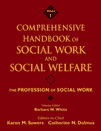Healing the Disjuncture: Social Work Disability Practice
Abstract
Until late in the 20th century, disability was conceptualized primarily as an embodied deficit, creating and perpetuating disability as the object of medicalized professional intervention and in many cases exclusion and segregation. This view, while still a dominant explanatory theme for disability, by itself, is limiting to social workers who seek to advance the commitment of social work to celebrate diversity and promote social justice for all people. Fortunately, rich theory and research developments in disability studies, humanities, and social sciences have been instrumental in simultaneously broadening and deepening analyses of disability necessary to guide responsive, holistic social work in the 21st century. This chapter brings this rich discussion to inform social work knowledge and practice, through analyzing disability as an important and omnipotent element of human diversity. Our analysis is framed through a contemporary theoretical lens, Explanatory Legitimacy Theory, that unpacks and foregrounds the value and contextual dimensions of human categorization and provides guidance for informed social action relevant to disability in a global era.
The chapter begins with the conceptual and chronological perimeters of human classification and an analysis of the emergence of diversity as equivalent to marginalized categories. Explanatory legitimacy theory is then presented, applied and illustrated in disability practice in social work.



